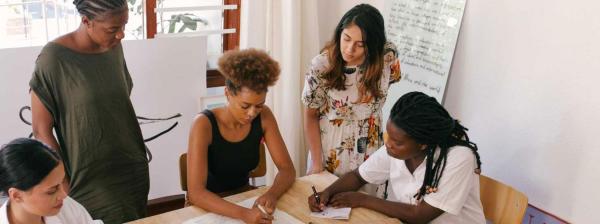As a high school student, Alisha Attema was inspired as she sat in an auditorium listening to a presentation delivered by the Stephen Lewis Foundation. Hearing of grassroots, community-based partnerships reinforced her passion for international development—but it was a conversation with Stephen Lewis’ daughter following the talk that influenced her career trajectory.
“She said to me, ‘Go and get a hard skill. Go become a nurse, a doctor, a lawyer, a farmer,” recalled Attema. Fuelled by this experience, Attema studied nursing and, like many students in health-related fields, volunteered abroad to gain experience in an intercultural environment.
Armed with a sense of adventure and a desire to build their résumés while making a difference, students in health-related fields are increasingly volunteering overseas. Opportunities to do so seemingly grow every day—however, so do the criticisms of global health volunteerism.
If you’re eager to contribute overseas, here are five ways to avoid common pitfalls of global heath volunteerism:
1. Plan your placement accordingly.
Many organizations that arrange volunteer placements that are as short as two weeks or even five days. But Rebecca Tiessen, a professor at the University of Ottawa, stresses that program length does matter. In her research examining perceived impacts of volunteers abroad, Tiessen found that regardless of sector, host organizations prefer long-term volunteers, who are able to stay for six months or more.
“It’s not volunteering, it’s tourism,” said Tiessen of two-week placements. “It doesn’t meet any of the needs, demand of criteria of our host partners.”
Volunteering with limited supervision in an underserved, resource-constrained setting can harm not only the locals, but the volunteers as well.
While some organizations may offer substantive short-term placements, adjusting to a new culture, community and workplace environment—particularly within the context of a different medical system—takes time, as Nova Gayle discovered. During nursing school, Gayle participated in a four-month volunteer opportunity in Ghana, but it still wasn’t nearly long enough.
“Four months really isn’t long when the work that you’re doing involves building relationships with people,” she said. “We need time to build trust and gain mutual understanding.”
2. Do your research.
In Raywat Deonandan’s global health class, history forms a core component of the curriculum. “You’re not going to understand what you’re seeing, unless you understand, to some extent, its origins,” said the University of Ottawa professor and epidemiologist. For example, understanding the history of colonialism may help to facilitate your understanding of global health inequalities that can be seen today.
In addition to participating in pre-departure training, learn as much of the language as you can. Research the health challenges specific to the country you are volunteering in, as well as the socio-economic and political factors that contribute to these health challenges.
3. Know your limitations and work within them.
With only a year of nursing school under her belt, Gayle was immediately faced with an ethical challenge in Ghana. “My first day was with the medical officer, who wanted me to prescribe medication to people coming to the outpatient clinic,” she said.
While Gayle explained to the officer what she could and could not do, saying no to an opportunity to provide treatment or perform a procedure that you’re not trained to do can be very difficult. According to the World Health Organization, sub-Saharan Africa accounts for only three per cent of the world’s health workforce, but 25 per cent of the global burden of disease. This is one of the reasons why, as medical anthropologist Lauren Wallace writes, well-intentioned volunteers may feel pressured to go beyond their scope of training. Working with limited supervision in an underserved, resource-constrained setting creates a high risk of harming not only the locals, but the volunteers as well.
An individual's right to safe, quality care shouldn’t be determined by where they live. “It was drilled into our heads before we went [to Rwanda on a one-month volunteer trip] that if you wouldn’t do it in Canada, then you are not allowed to do it there. Why should their lives be worth less than someone’s life in Canada?” said Attema.
4. Recognize your privilege.
By virtue of receiving training in a Western nation, you may be viewed as an expert. Your colleagues and patients alike may assume that you know more than you do, or are able to do more than you actually can.
Working in partnership with local health practitioners is important to dispelling this myth. During mobile health projects in Guyana, Deonandan observed firsthand how the presence of foreign health professionals could weaken the perceived value of local health care providers.
“The locals would get very excited and they would save up all of their issues for the high-powered foreign doctors; the local caregiver was diminished in comparison,” he said.
As a volunteer from a Western country, recognize the privilege that enables you to volunteer abroad and the entrenched inequality that limits the possibility of individuals from the global south from doing the same. Approach your work with humility and recognize the opportunity to learn from local expertise.
5. Consider volunteering locally instead.
Why is it that you want to volunteer abroad? Are you looking to pad your résumé, enhance your clinical skills, or just travel? Whatever your motivations, be honest; this will allow you to fully evaluate your potential impacts on a host community, including the negative ones.
Consider whether your skills might be better used elsewhere—and whether you can gain exposure to similar conditions in your home community. For example, if you’re interested in working with vulnerable populations, specializing in a particular type of care, or developing clinical skills within a cross-cultural context, try connecting with local community health, refugee or immigrant centres.
“There’s a lot of globally engaged volunteering that can happen at home,” said Tiessen.
Travelling abroad can be exciting. Volunteering abroad adds another layer of considerations. “The second you start purporting to be making change, you have to recognize that comes with certain responsibilities and expectations,” said Deonandan.
Global volunteerism has the potential to foster global inter-connectedness and solidarity. It can also be fraught with challenges and controversies, but the solution isn’t to disengage entirely. Instead, approach volunteering abroad with self-awareness, humility and motivations that maximize potential benefits and minimize harm.
This article originally appeared in Verge's Fall 2016 issue.
Add this article to your reading list




